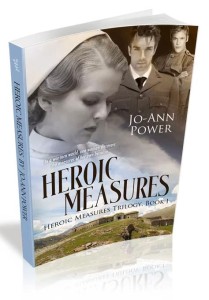Jordan Dane
@JordanDane
I’m very pleased to have my guest, Jo-Ann Power, at the Kill Zone today. Her new novel involved historical research of WWII that I thought you might find interesting. I’ve bought the book for my mom who always talks about her teens years as “Rosie the riveter” during the war effort. This historical period has been fascinating to me. Enjoy and take it away, Jo-Ann.
Grateful to be a guest here at TKZ, I know the importance of solid research for any kind of fiction. Having written a few mysteries and many historicals, I know the value of fact as the bedrock of any entertainment for readers.
For HEROIC MEASURES, my novel about American nurses serving on the front lines in France during the Great War, I did research that led me to many of the same resources that many writers use. First, I read general histories for an overview of the conflict. Then I haunted the stacks of the Library of Congress in Washington, D.C. and the National Archives for weeks on end. Newspapers from those years plus nurses’ letters, diaries and photos gave me tiny facts that provided not only color but an accuracy obscured by general histories.
Next I went to Army facilities like Carlisle Barracks in Pennsylvania where the Army keeps its repositories of memorabilia of soldiers and nurses who served in that first global conflict. I traveled to Cantigny in Wheaton Illinois where curators there pulled primary and secondary documents from their collection of recruits who served in the First Division of the American Expeditionary Forces.
My longest (and most delightful) excursion was to France. For three weeks, I walked the front lines of our American soldiers in northern France. I visited the battle lines, overgrown with moss and grass but many still pock-marked with fox holes and shell holes. I saw the terrain our soldiers fought through. The wide plains of farmland they ran through. The woods where they drew their bayonets and fell into hand-to-hand combat. I saw the territory where peaceful rivers now run and understood by viewing the terrain why keeping control of this river or that mountain was vital to the defense of a town, a section of the land or Paris, itself.
I talked with the curators of those museums, the people who live there and tell tales of their ancestors who lived there at the time. I discussed the valor of nurses and YMCA workers, Salvation Army volunteers and ambulance drivers. I walked the pristine rows of American cemeteries where the remains of more than 40,000 of our American men and women lie in testament to their devotion.
What did I learn in those trips? I learned about the weather in the spring time in France. Wet and cold. Just as it was so very often during the four years of war. I learned about the fertility of the Champagne and Lorraine regions. The area then was rich: today France grows 20% of the produce for European Union. I saw the importance of the City of Verdun. Nestled in the mountains, this city is the main route for two rivers. Control this city and the victor controls the major water route to Paris. I experienced the diversity of culture in the Alsace where many speak not only French, but English and German. I heard from them how they intermarried, and I could understand how they had to divide their loyalties and how difficult that was one hundred years ago.
I also learned from our American directors of our cemeteries that very few Americans come to these hallowed grounds to pay their respects. Most travel to Normandy, remembering the valor of those who took the beach in 1944. But in the coming five years, I hope you will remember the valor of the first group of Americans who went to serve and suffer and fight in Europe. I hope you will rent a car at the Paris airport and head into the Champagne, not merely to drink the best bubbly you will ever enjoy, but to visit these cemeteries, talk to the staff and ask them about the valor of these first American adventurers. They have stories to tell.
Mine is fictitious. But based in fact.
Here is one woman’s story of her journey from her small hometown to the greater world. I hope you enjoy HEROIC MEASURES.
For more on American nurses, read Jo-Ann’s HEROIC MEASURES blog: http://theyalsofought.blogspot.com
For the purposes of discussion at TKZ, how far have you gone for research and authenticity in your writing? Are any of you writing a period piece involving historical research? If you are, tell us about the challenges.
How heroic are you? Would you volunteer to travel thousands of miles from home with others you don’t know to live in tents, wash your hair in your helmet and work 12-24 hours each day?
In the Great War, thousands of women did. HEROIC MEASURES is the novel that shows you how American nurses went to war, how they lived and served—and how they loved.
For nurse Gwen Spencer, fighting battles is nothing new. An orphan sent to live with a vengeful aunt, Gwen picked coal and scrubbed floors to earn a living. But when she decides to become a nurse, she steps outside the boundaries of her aunt’s demands…and into a world of her own making.
Leaving her hometown for France, she helps doctors mend thousands of brutally injured Doughboys under primitive conditions. Amid the chaos, she volunteers to go ever forward to the front lines. Braving bombings and the madness of men crazed by the hell of war, she is stunned to discover one man she can love. A man she can share her life with.
But in the insanity and bloodshed she learns the measures of her own desires. Dare she attempt to become a woman of accomplishment? Or has looking into the face of war and death given her the courage to live her life to the fullest?
HEROIC MEASURES BUY links: Amazon digital, Amazon print, Barnes and Noble, Kobo, iTunes, Allromanceebooks.com, Wild Rose Press


